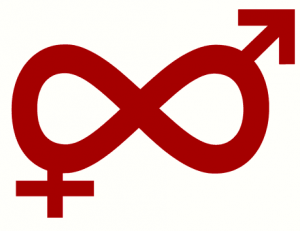Difference between revisions of "Intersex"
From LGBT Archive
Ross Burgess (Talk | contribs) |
Ross Burgess (Talk | contribs) |
||
| Line 3: | Line 3: | ||
:"An intersex person may have the biological attributes of both sexes or lack some of the biological attributes considered necessary to be defined as one or the other sex."<ref>http://oiiinternational.com/2533/welcome/ OII International website</ref> | :"An intersex person may have the biological attributes of both sexes or lack some of the biological attributes considered necessary to be defined as one or the other sex."<ref>http://oiiinternational.com/2533/welcome/ OII International website</ref> | ||
| − | == | + | ==Chromosome differences== |
| − | The nucleus of a | + | The nucleus of a human cell usually contains 46 chromosomes, comrpising 22 pairs of autosomes, plus two allosomes (sex chromosomes). The two allosomes are usually X and Y for a man, or X and X for a woman. Some other combinations are: |
| + | |||
| + | *45,X in which there is one X chromosome and the other chromosome is missing, also known as Turner syndrome | ||
| + | *47,XYY | ||
| + | *46,XXY or Klinefelter's syndrome | ||
| + | *47,XXX or triplo-X syndrome | ||
==References== | ==References== | ||
Revision as of 19:31, 10 December 2015
Intersex is a term applied to people whose biological sex cannot be classed as clearly male or female.- "An intersex person may have the biological attributes of both sexes or lack some of the biological attributes considered necessary to be defined as one or the other sex."[1]
Chromosome differences
The nucleus of a human cell usually contains 46 chromosomes, comrpising 22 pairs of autosomes, plus two allosomes (sex chromosomes). The two allosomes are usually X and Y for a man, or X and X for a woman. Some other combinations are:
- 45,X in which there is one X chromosome and the other chromosome is missing, also known as Turner syndrome
- 47,XYY
- 46,XXY or Klinefelter's syndrome
- 47,XXX or triplo-X syndrome
References
- This article is a stub. You can help the UK LGBT History Project by expanding it.
- ↑ http://oiiinternational.com/2533/welcome/ OII International website
